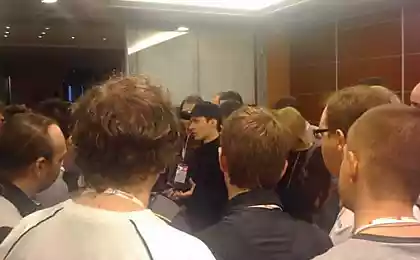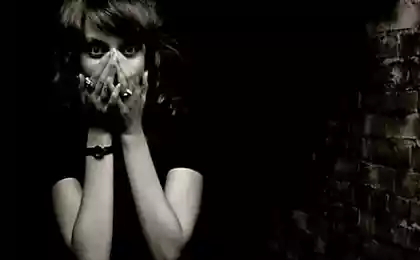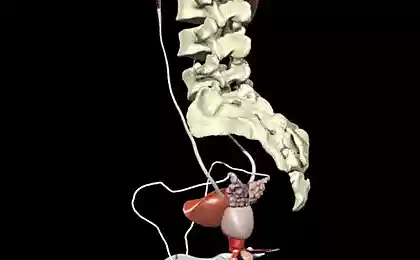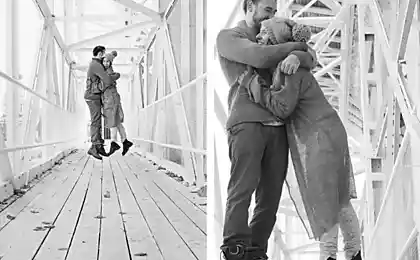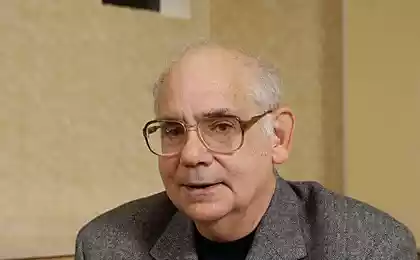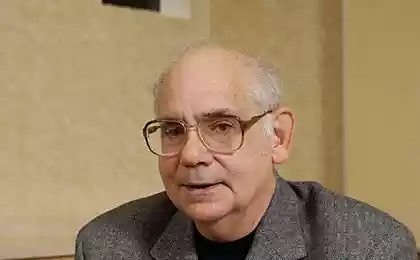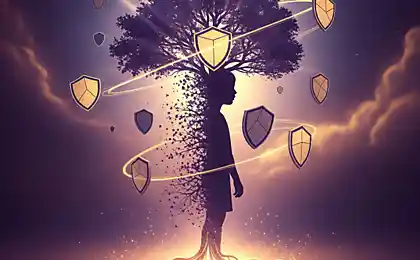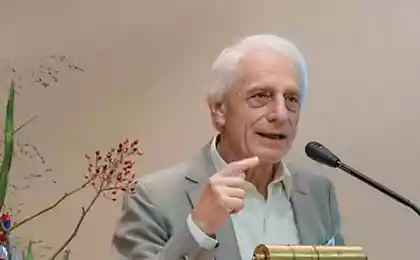484
3 dialogue that can destroy your relationship
Unhappy couples always tell me that they are fighting either for money or children or sex.They also say that they can't communicate with each other, and the only solution to the problem lies in the fact that the partner needs to change.
"If Mary was not dissipated, and listened to my arguments concerning the family budget and education of children, we would have found some sort of solution," tells me Brian. "Yes, and if Brian did most of the talking, not silently left, we would have no quarrel. I think that here begin our disagreements," answers Mary.

The experience of over 25 years in the field of couples therapy, as well as research in the area of relationships tells me that Mary and Brian see only the tip of the iceberg. If you dig deeper, the real problem lies in the fact that both partners are emotionally detached from each other.
They see only each other's backs, I hear only criticism, loneliness and separation. Any good arguments, and episodes of prolonged silence are merely a cover for the main issues plaguing the partners in their love of the tragedy: "You're still here to take care of me? If I'm important and my feelings for you? If you'd answer me when I need you?" The answers to these questions so difficult to ask and so difficult to hear in the middle of an argument and make a crucial contribution to a sense of emotional security, or, conversely, danger and emotional hunger.
From many researches concerning the love, of which there were many in the last decade, we have learned that emotional response is what builds or destroys the relationship.
Happy and stable couple can seriously quarrel, however they can also "tune in" to each other and to reestablish emotional connection after conflict. In our studies, we found that seven out of ten couples held emotionally-focused therapy, or abbreviated (EFT), are able to restore their relationship. They find a way to get out of a state of emotional disconnectedness, and restore safe affair, in which are built a trusting relationship. But why not all of us are able to do it, without resorting to the services of a therapist, for example? What stands in our way? The new science of love answers this question.
Favorite people — our refuge from the ills of life. When he is unavailable and unresponsive, then a tsunami of emotions, such as sadness, anger, pain and, most importantly, fear knocks us down. This fear lies deep within us. Able to rely on a loved one, to know that he or she will respond to our appeal — the inherent code of survival.From the study it is clear that, when we are faced with a situation in which a love relationship is under threat, we possesseda primitive alarm.
There are only three ways of struggle with a sense of impending loss and separation. If most of the time we are in safe and happy relationships, we understand the need for emotional connection and openly pronounces their needs, thus helping the partner to respond with love. If the relationship is shaky, we don't know how to voice their needs, so either angrily demand something from a partner, seeking his reaction, or close and go away in self-defense.

No matter what, and what words we speak, the main thing that always implies only the following: "notice me. Stay with me. I need you". Or "I will not allow you to hurt me. I calm down and try to control the situation."
If these strategies come to the fore and occupy a Central place in the relationship, then it's very possible we'll be stuck in what I call the "devilish dialogues". Such dialogues can destroy relationships. They create an atmosphere of mutual resentment, suspicion and increase the distance between partners up until they reach the point where the only solution will be to give up and retreat.
There are three main "infernal dialogue", some couples fall into the trap of irresolvable emotional hunger and feelings of insecurity:
1. To find the culprit
This dead-end pattern of mutual accusations immediately discards the partners a few kilometers from each other. Quarrels similar to a contest called "who better to describe". Says pam: "I'm waiting for criticism in their address. At the same time she is also in full combat readiness. I may pull the trigger even when he's just passing by." Both partners consider each other indifferent, and to some extent defective. Everybody loses. But a similar pattern of "a tooth for a tooth" is very difficult to reproduce for a long time. As a rule, this is the first step to the most common and confusing dance called "polka protest."

2. Polka protest
Psychologists have long known that this dance is a "demand — removal" eventually leads to divorce, but they could not understand why it is so widespread and dangerous. We now know that this pattern is activated under the influence of powerful emotions and vital needs: deeply embedded in us emotional contact, and also out of fear of being rejected and abandoned.Even if by mind we understand that criticism of the partner and the fencing off of him only making things worse, we can't push the magic button to just turn off the internal anguish and fear.
"The longer he's not talking to me and disregards my feelings, the more I get angry and tell him taunts," shares MIA. "The course is any trick if only to get him to react somehow".
Her partner Jim was immediately included in the conversation: "And the longer I hear her angry tone, the more I realize that I will never be able to please her. The situation seems hopeless, I closed and silent". This spiral is the main enemy of the relationship, not the partner. Although none of the parties to the conflict, it is not obvious. MIA protested against the fact that Jim is being moved away from her. And Jim desperately tries to avoid her disapproval. They talk that way because they feel anxious response to the main question of attachment: "You're still close to me?" In the "protest polka" each of the partners in an attempt to cope with internal feeling of emotional separation unwittingly confirms the worst fears of the other,and the spiral continues to spin. In the end, protester demanding partner gives up the struggle for the reunification of lost of communication, mourns the relationship and walks away. All this leads to the last dance of all.
3. Freeze and run
In this dance, both partners feel helpless. Here nobody is trying anyone to get through. No one takes any risks.All hiding under a shell of protection. In the relationship of another kind such as a short time can be considered a normal variant, but relationships with loved ones, which we really love, "unrequited dance" tragic and painful. In this dance, partners are not even dancing. Everyone just sits on the sidelines. We don't have long to endure this type of isolation.If the situation does not change, then the relationship is transferred to the stage, similar to the uncontrolled free fall.
When couples come to me, steeped in the atmosphere of the "devilish dialogues" and ask: "do we have hope for a shared future?" I reply "of Course!"
When we understand what really love is, what needs and fears in us, we can help each other to get out of these negative conversations and start communicating with love, returning to each other's arms, to his home. published
Author: sue Johnson, translated by Catherine Chabanenko, the editors Julia Tverdohlebova
P. S. And remember, just changing your mind — together we change the world! © econet
Source: alpha-parenting.ru/2017/02/06/gde-oshiblas-lyubov-ili-tri-dyavolskih-dialoga-kotoryie-mogut-razrushit-vashi-vzaimootnosheniya/
"If Mary was not dissipated, and listened to my arguments concerning the family budget and education of children, we would have found some sort of solution," tells me Brian. "Yes, and if Brian did most of the talking, not silently left, we would have no quarrel. I think that here begin our disagreements," answers Mary.

The experience of over 25 years in the field of couples therapy, as well as research in the area of relationships tells me that Mary and Brian see only the tip of the iceberg. If you dig deeper, the real problem lies in the fact that both partners are emotionally detached from each other.
They see only each other's backs, I hear only criticism, loneliness and separation. Any good arguments, and episodes of prolonged silence are merely a cover for the main issues plaguing the partners in their love of the tragedy: "You're still here to take care of me? If I'm important and my feelings for you? If you'd answer me when I need you?" The answers to these questions so difficult to ask and so difficult to hear in the middle of an argument and make a crucial contribution to a sense of emotional security, or, conversely, danger and emotional hunger.
From many researches concerning the love, of which there were many in the last decade, we have learned that emotional response is what builds or destroys the relationship.
Happy and stable couple can seriously quarrel, however they can also "tune in" to each other and to reestablish emotional connection after conflict. In our studies, we found that seven out of ten couples held emotionally-focused therapy, or abbreviated (EFT), are able to restore their relationship. They find a way to get out of a state of emotional disconnectedness, and restore safe affair, in which are built a trusting relationship. But why not all of us are able to do it, without resorting to the services of a therapist, for example? What stands in our way? The new science of love answers this question.
Favorite people — our refuge from the ills of life. When he is unavailable and unresponsive, then a tsunami of emotions, such as sadness, anger, pain and, most importantly, fear knocks us down. This fear lies deep within us. Able to rely on a loved one, to know that he or she will respond to our appeal — the inherent code of survival.From the study it is clear that, when we are faced with a situation in which a love relationship is under threat, we possesseda primitive alarm.
There are only three ways of struggle with a sense of impending loss and separation. If most of the time we are in safe and happy relationships, we understand the need for emotional connection and openly pronounces their needs, thus helping the partner to respond with love. If the relationship is shaky, we don't know how to voice their needs, so either angrily demand something from a partner, seeking his reaction, or close and go away in self-defense.

No matter what, and what words we speak, the main thing that always implies only the following: "notice me. Stay with me. I need you". Or "I will not allow you to hurt me. I calm down and try to control the situation."
If these strategies come to the fore and occupy a Central place in the relationship, then it's very possible we'll be stuck in what I call the "devilish dialogues". Such dialogues can destroy relationships. They create an atmosphere of mutual resentment, suspicion and increase the distance between partners up until they reach the point where the only solution will be to give up and retreat.
There are three main "infernal dialogue", some couples fall into the trap of irresolvable emotional hunger and feelings of insecurity:
1. To find the culprit
This dead-end pattern of mutual accusations immediately discards the partners a few kilometers from each other. Quarrels similar to a contest called "who better to describe". Says pam: "I'm waiting for criticism in their address. At the same time she is also in full combat readiness. I may pull the trigger even when he's just passing by." Both partners consider each other indifferent, and to some extent defective. Everybody loses. But a similar pattern of "a tooth for a tooth" is very difficult to reproduce for a long time. As a rule, this is the first step to the most common and confusing dance called "polka protest."

2. Polka protest
Psychologists have long known that this dance is a "demand — removal" eventually leads to divorce, but they could not understand why it is so widespread and dangerous. We now know that this pattern is activated under the influence of powerful emotions and vital needs: deeply embedded in us emotional contact, and also out of fear of being rejected and abandoned.Even if by mind we understand that criticism of the partner and the fencing off of him only making things worse, we can't push the magic button to just turn off the internal anguish and fear.
"The longer he's not talking to me and disregards my feelings, the more I get angry and tell him taunts," shares MIA. "The course is any trick if only to get him to react somehow".
Her partner Jim was immediately included in the conversation: "And the longer I hear her angry tone, the more I realize that I will never be able to please her. The situation seems hopeless, I closed and silent". This spiral is the main enemy of the relationship, not the partner. Although none of the parties to the conflict, it is not obvious. MIA protested against the fact that Jim is being moved away from her. And Jim desperately tries to avoid her disapproval. They talk that way because they feel anxious response to the main question of attachment: "You're still close to me?" In the "protest polka" each of the partners in an attempt to cope with internal feeling of emotional separation unwittingly confirms the worst fears of the other,and the spiral continues to spin. In the end, protester demanding partner gives up the struggle for the reunification of lost of communication, mourns the relationship and walks away. All this leads to the last dance of all.
3. Freeze and run
In this dance, both partners feel helpless. Here nobody is trying anyone to get through. No one takes any risks.All hiding under a shell of protection. In the relationship of another kind such as a short time can be considered a normal variant, but relationships with loved ones, which we really love, "unrequited dance" tragic and painful. In this dance, partners are not even dancing. Everyone just sits on the sidelines. We don't have long to endure this type of isolation.If the situation does not change, then the relationship is transferred to the stage, similar to the uncontrolled free fall.
When couples come to me, steeped in the atmosphere of the "devilish dialogues" and ask: "do we have hope for a shared future?" I reply "of Course!"
When we understand what really love is, what needs and fears in us, we can help each other to get out of these negative conversations and start communicating with love, returning to each other's arms, to his home. published
Author: sue Johnson, translated by Catherine Chabanenko, the editors Julia Tverdohlebova
P. S. And remember, just changing your mind — together we change the world! © econet
Source: alpha-parenting.ru/2017/02/06/gde-oshiblas-lyubov-ili-tri-dyavolskih-dialoga-kotoryie-mogut-razrushit-vashi-vzaimootnosheniya/

